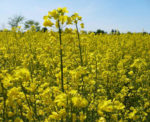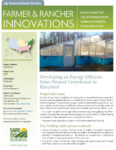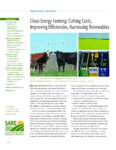Showing 1-6 of 6 results
Northeast Farm Energy IQ
Farm Energy IQ offers free information to help farmers enhance operational sustainability in the context of the farm economy and ecosystem.

Sustainable Production and Use of On-Farm Energy
Using solar or wind energy or producing biofuels from crop feedstocks and anaerobic digestion helps farmers achieve energy independence while improving profitability and reducing fossil fuel emissions.

Developing an Energy Efficient, Solar-Heated Greenhouse in Maryland
This project investigated the effectiveness of energy-efficient greenhouse design and the ability of water-heating solar panels to heat a greenhouse as a propane alternative.

Thermal Banking for Cold Storage
Steven Schwen's innovative energy conservation strategy uses thermal banking technology to conserve heat in his greenhouse and for cold storage.

Thermal Banking Greenhouses
Steven Schwen uses thermal banking to significantly reduce the energy costs of running a greenhouse for cold-season production.

Clean Energy Farming
Clean Energy Farming: Cutting Costs, Improving Efficiencies, Harnessing Renewables features innovative SARE-funded research and examples of farmers who are improving energy efficiency while saving money, implementing farming practices that both save energy and protect natural resources, and producing and using renewable fuels.